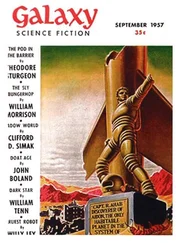"Something for you to wear. You're going to go down into this animal."
"Into that mass of flesh?" For a moment horror left him with his mouth open. Then anger took over. "Like hell I am."
"Look, Doctor, it's necessary. We want to keep this beast alive—for scientific purposes, as well as possible value as a food animal. And how can we keep it alive unless we learn something about it?"
"There's plenty we can learn without going into it. Plenty of tests we can make first. Plenty of—"
He caught himself abruptly because he was talking nonsense and he knew it. You could take the thing's temperature—but what would the figure you got tell you? What was normal temperature for a space-cow? What was normal blood pressure—provided the creature had blood? What was normal heartbeat—assuming there was a heart? Presumably the thing had teeth, a bony skeleton—but how to learn where and what they were? You couldn't X-ray a mass of flesh like this—not with any equipment he had ever seen, even in the best-equipped office.
There were other, even more disquieting ways in which he was ignorant. What kind of digestive juices did the thing have? Suppose he did go down in a divers uniform —would the juices dissolve it? Would they dissolve the oxygen lines, the instruments he used to look around and probe the vast inside of the beast?
He expressed his doubts to the Captain, and the latter said, "These suits have been tested, and so have the lines. We know that they can stand a half hour inside without being dissolved away. If they start to go, you'll radio to us, and we'll pull you up."
"Thanks. How do I know that once the suit starts to go, it won't rip? How do I know that the juices simply won't eat my skin away?"
There was no answer to that. You just didn't know, and you had to accept your ignorance.
Even while he was objecting, Dr. Meltzer began putting on the suit. It was thin and light, strong enough to withstand several atmospheres of pressure, and at the same time not so clumsy as to hamper his movements considerably. Scaled pockets carried an assortment of instruments and supplies. Perfect two-way communication would make the exchange of ideas—such as they might be—as easy as if the person he was talking to were face to face with him. With the suit came a pair of fragile-looking gloves that left his hands almost as free as if they were bare. But the apparent fragility was misleading. Mechanical strength was there.
But what about resistance to biological action? The question kept nagging him. You can't know, he told himself. About things like that you take a chance. You take a chance and hope that if anything goes wrong, they'll pull you up before the juices have time to get working on you.
They had everything in readiness. Two of the other men were also wearing uniforms like his own, and when he had put his on, and tested it, the Captain gave the signal, and they all went into a small airlock. The door sealed behind them, a door in front opened. They were in the chamber where the great beast lay and quivered dully as if in giant pain.
They tied strong thin plastic cords around Doctor Meltzer's waist, tested the oxygen lines. Then they put a ladder up in front of the beast's face. Doctor Meltzer had a little trouble breathing, but it was not because of anything wrong with the oxygen supply. That was at the right pressure and humidity, and it was mixed with the correct amount of inert gases. It was merely the thought of going down into the creature's belly that constricted his throat, the idea of going into a strange and terrible world so different from his own, of submitting to unimaginable dangers.
He said hoarsely into the radio speaker, "How do I get in anyway, knock? The mouth's at least forty feet off the ground. And it's closed. You've got to open it, Captain. Or do you expect me to pry it open myself?"
The two men with him stretched out a plastic ladder. In the low gravity of Mars, climbing forty feet was no problem. Dr. Meltzer began to pull his way up. As he went higher, he noticed that the great mouth was slowly opening. One of the men had poked the creature with an electric prod.
Dr. Meltzer reached the level of the low jaw, and with the fascinated fear of a bird staring at a snake, gazed at the great opening that was going to devour him. Inside there was a gray and slippery surface which caught the beam of his flashlight and reflected it back and forth until the rays faded away. Fifty feet beyond the opening, the passage made a slow turn to one side. What lay ahead, he couldn't guess.
The sensible thing was to go in at once, but he couldn't help hesitating. Suppose the jaws closed just as he got between them? He'd be crushed like an eggshell. Suppose that throat constricted with the irritation he caused it? That would crush him too. He recalled suddenly an ancient fable about a man who had gone into a whale's belly. What was the man's name, now? Daniel—no, he had only gone into a den of lions. Job—wrong again. Job had been afflicted with boils, the victim of staphylococci at the other end of the scale of size. Jonah, that was it. Jonah, the man whose name was a symbol among the superstitious for bad luck.
But a scientist had no time for superstition. A scientist just thrust himself forward.
He stepped off the ladder into the great mouth. Beneath him, the jaw was slippery. His feet slid out from under him, and then his momentum carried him forward, and he glided smoothly down the yawning gullet. It was like going down a Martian hillside on a greased sled, the low gravity making the descent nice and easy. He noticed that the cords around his waist, as well as the oxygen lines, were descending smoothly after him. He reached the turn, threw his body away from the gray wall, and continued sliding. Another fifty feet, and he landed with a small plash in a pool of liquid.
The stomach? Never mind what you called it, this was probably the beginning of a digestive tract. He'd have a chance now to see how resistant his suit was.
He was immersed in the liquid now, and he sank slowly until his feet touched more solid flesh again. By the beam from his flashlight, he saw that the liquid around him was a light green. The portion of the digestive tract on which he stood was slate gray, with bright emerald streaks.
A voice spoke anxiously in his ears. "Doctor Meltzer! Are you safe?"
"Fine, Captain. Having a wonderful time. Wish you were here."
"What's it like in there?"
"I'm standing at the bottom of a pool of greenish liquid. I'm fascinated, but not greatly instructed."
"See anything that might be wrong?"
"How the devil would f tell right from wrong in here? I've never been in one of these beasts before. I've got sample bottles, and I'm going to fill them in various places. This is going to be sample one. You can analyze it later."
"Fine, Doctor. You just keep on going."
He flashed the beam around him. The liquid was churning gently, possibly because of the splash he himself had made. The gray-green walls themselves were quiet, and the portion underfoot yielded slightly as he put his weight upon it, but was otherwise apparently undisturbed by his presence.
He moved ahead. The liquid grew shallower, came to an end. He climbed out and stepped cautiously forward. "Doctor, what's happening?"
"Nothing's happening. I'm just looking around." "Keep us informed. I don't think there's any danger, but—"
"But in case there is, you want the next man to know what to watch out for? All right, Captain."
"Lines all right?"
"They're fine." He took another step forward. "The ground—I suppose I can call it the ground—is getting less slippery. Easier to walk on. Walls about twenty feet apart here. No sign of macroscopic flora or fauna. No artifacts to indicate intelligent life."
Читать дальше








